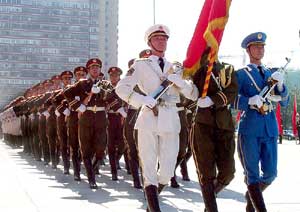China demands loyalty from the military as 20 million lose their jobs
02 Feb 2009
 The Chinese government warned yesterday that 2009 will be the toughest year in the century for China as more 20 million migrant workers have lost their jobs in wake of the global crisis that has taken a toll on the country's economy;
The Chinese government warned yesterday that 2009 will be the toughest year in the century for China as more 20 million migrant workers have lost their jobs in wake of the global crisis that has taken a toll on the country's economy;
Intriguingly, it has asked the military to obey the Communist Party in view of multiple security threats ahead.
 China, which usually does not put authenticated figures out in public domain, yesterday said about 20 million rural migrant workers have either lost their jobs or have not yet found employment and have gone home to the countryside, Chen Xiwen, director of the office of the central leading group on rural work, told journalists at a press briefing.
China, which usually does not put authenticated figures out in public domain, yesterday said about 20 million rural migrant workers have either lost their jobs or have not yet found employment and have gone home to the countryside, Chen Xiwen, director of the office of the central leading group on rural work, told journalists at a press briefing.
At a central meeting held yesterday, president and commission chairman Hu Jintao said the he expected the military to stand united and must obey the Communist Party absolutely in view of the multiple security threats that the country is likely to face soon.
Xinhua news agency reported that the military commission issued a statement to all military forces that they should "uncompromisingly obey the Party and Central Military Commission's command at any time and under any circumstances."
The communist party fears that the soaring unemployment numbers in the hinterland of China will lead to social unrest as well as the separatist movement in Tibet and the western region of Xinjiang.
The current year marks the 50 years of exile of the Dalai Lama to India as well as the well known 20th anniversary of the pro-democracy protest that took place in Beijing by Chinese students.
With about 15.3 per cent of the 130 million migrant workers returning home jobless from cities to the hinterland, ''Indeed, quite a large share of the rural migrant workers have lost their jobs,'' he told reporters in Beijing.
These 20 million jobless figures were released after the ministry of agriculture conducted a survey in 150 villages in 15 provinces, before the week-long New Year holiday, which began on 25 January.
China is reported to be monitoring closely the jobless figures in the 800 million people who live in the countryside, due to fears that a huge rise in unemployment may trigger social unrest and law and order problem, which the third largest world economy does not want to showcase the unemployment problem to the world after its economy having galloped in double digit figures for the past decade.
With a booming economy, boosted by an ever growing export sector, nearly 130 million rural Chinese had left their homes to gain employment in the prosperous manufacturing provinces along the sea coast, which produced many cheap consumer goods from toys, furniture, electronic goods and clothing among others and sold globally.
China's manufacturing sector is nearing a technical recession with nationwide manufacturing activity standing at 41.2 in December compared to a low of 40.9 in November as the global economic slowdown and recession in the US, UK, Japan and many EU countries takes its toll on Chinese manufacturing units and exports (See: Chinese manufacturing sector close to recession).
Small and medium firms which have labour intensive work like the manufacturing hubs, in Zhejiang and Guangdong provinces have seen massive layoffs due to production cuts and factory closures.
The impact has been felt more in cities like the Dongguan, an export hub near Hong Kong, where thousands of workers either remain unpaid or have lost their jobs as the toy factories battle the downturn overseas.
According to government and industry estimates, more than 68, 000 small companies nationwide collapsed in the first half of 2008 and about 2.5 million people have lost their jobs in the Pearl River Delta region alone last month.
China's exports declined 2.2 per cent year-on-year to $115 billion in November, the first monthly fall since June 2001, says China's General Administration of Customs (See: China's exports down 2.2 per cent in November)
Yesterday the Chinese government warned that 2009 will be "possibly the toughest year" since the turn of the century.
Releasing the first document of the year by jointly by the state council and the central committee of the communist party of China, it said that the current global financial crisis and the slowdown in the world economy had taken its toll and left a negative impact on the Chinese economy.
"The development of agriculture and rural areas in 2009 is of special significance, the biggest potential for boosting domestic demand lies in rural areas; the foundation for securing steady and relative fast economic growth is based upon agriculture; the toughest work of securing and improving people's livelihoods stays with farmers, it said."
The document has asked companies to take on social responsibilities by hiring rural migrant workers and also urged the local and central government departments to come out job creating schemes and increase the income of rural people.




















